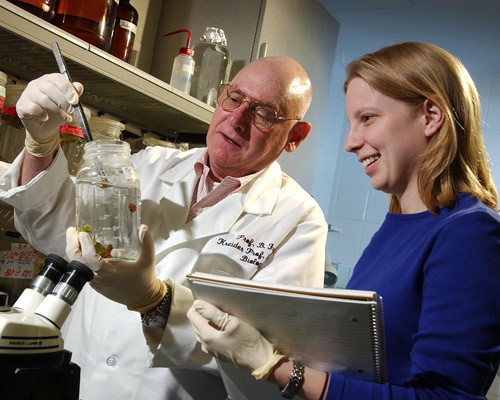Biochemistry major Elizabeth Ponder ’04 (Collegeville, Pa.) is investigating the physiology of a flatworm known as Echinostoma caproni as an EXCEL Scholar this summer with Bernard Fried, professor emeritus of biology, and Joseph Sherma, professor emeritus of chemistry.
“Echinostoma caproni is a parasite,” she says. “A great deal has been studied about its infectious properties, but little is known about its physiology.”
Ponder is using thin layer chromatography to research how Echinostoma caproni uses amino acids to regulate its metabolism in various environments.
“We’ve examined what type and the quantity of amino acids leaked from the worms in Locke’s solution, which simulates the mammalian gut, versus those leaked from the worm in deionized water,” Ponder says.
Some scientists suggest that the presence of amino acids helps the worms regulate water flow across their bodies when the environment changes their tonicity, the normal firmness or functional readiness in body tissues or organs.
“The best way to answer this question is to study the effects of tonicity on as many of these organisms as possible in the hope that it will reveal the role that amino acids play,” she adds.
Ponder is a wonderful student, Fried says, adding, “Elizabeth is learning a lot of methodology, such as thin layer chromatography and also how to handle a worm sample in different media and sample preparation.”
Ponder says the EXCEL program is providing her with an excellent opportunity to get hands-on laboratory experience.
“Professor Fried and Professor Sherma are extremely experienced and knowledgeable,” she says. “Their encouragement pushes me to test my own abilities in problem-solving, as well as to build practical skills in designing, carrying out, and summarizing original research for publication in scientific journals.”
“It’s a chance to explore original ideas in science rather than merely repeating past experiments in a classroom setting,” Ponder adds. “I also get the opportunity to pick the brains of two highly honored and well respected scientists in a one-on-one setting.”
Since the 1980s, Sherma and Fried have been working together to research the chemical content of parasitic flatworms and medically important snails, pheromones released by parasites and snails, and various snail food items. Fried’s work has led to the naming of three organisms in his honor. Last year, the Discovery Channel featured him in a special one-hour, prime time program about parasites.
In April, Ponder received Lafayette’s Eugene P. Chase Phi Beta Kappa Prize, awarded to sophomores who have demonstrated scholarship as first-year students. She is a member of the McKelvy House Scholars program, in which 15-20 students of high academic achievement and promise reside together in an historic off-campus house and participate in shared intellectual and social activities.
A graduate of Spring-Ford High School, Ponder plans to work toward a doctorate in virology or a related field in hopes of making advances in AIDS research. She is a member of the campus chapter of American Chemical Society and participates in the flute ensemble and jazz band.

Goldwater Scholarship. Beth Ponder ’04 received a Goldwater Scholarship, premier national undergraduate award of its type in math, science, and engineering. One of her mentors is Bernard Fried, professor emeritus of biology.
